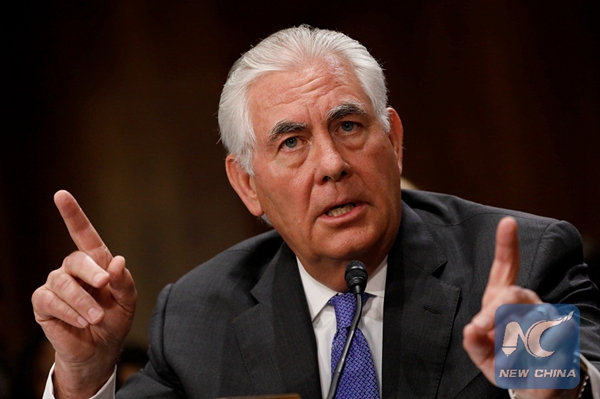Tillerson’s Gulf trip has limited achievements
- By Duan Jiuzhou
 0 Comment(s)
0 Comment(s) Print
Print E-mail China.org.cn, July 21, 2017
E-mail China.org.cn, July 21, 2017
|
|
|
U.S. Secretary of State Rex Tillerson [Xinhua] |
U.S. Secretary of State Rex Tillerson visited Doha on July 11 meeting with Qatar's Emir Sheikh Tamim bin Hamad Al-Thani and Qatari Foreign Minister Mohammed bin Abdulrahman al Thani, resulting in the signing of a Memorandum of Understanding on blocking the funding of terrorism.
Tillerson then left for Jeddah, Saudi Arabia, to meet with the foreign ministers of Saudi Arabia, the United Arab Emirates (UAE), Egypt and Bahrain – the four countries that broke diplomatic relations with Qatar on June 5, and imposed sanctions – trying to persuade them to stop escalating the crisis.
Muslim Brotherhood – the root of the Qatar crisis
The list of 13 requirements set for Qatar to restore diplomatic relations made by the four countries has passed the July 10 deadline.
The four countries hoped Qatar will sever its ambiguous relationship with Iran, shut down the Al Jazeera news operation and stop providing citizenship to other Arab countries' political opponents.
Despite mediation efforts by high-level U.S. and Kuwaiti officials, Qatar still considered it a violation of its sovereignty and refused to bow to the pressures. Meanwhile, the four countries cutting ties with Qatar repeatedly said the list was not open to negotiation, and have threatened further sanctions if negotiation fails.
Actually, the key issue is the relationship between Qatar and the Muslim Brotherhood. Since the outbreak of widespread political unrest in the Arab world at the end of 2010, the Gulf countries have regarded regime stability as a major concern.
Although the Al Jazeera played a role of facilitator in the street movement to overthrow the Egyptian Muhammed Hosni Mubarak government, Qatar was still involved in the Saudi Arabia-led military action to quell the unrest in Bahrain in 2011.
However, with the Muslim Brotherhood's political ascent after 2011, Qatar has begun to strongly support such activities contrary to the interests of other Gulf countries.
This reflects the ideological orientation of Qatar. For a long time, Qatar has taken in and provided shelters for members of the Muslim Brotherhood, and Al Jazeera is an important platform for the dissemination of the former’s ideas.
It believes that the Muslim Brotherhood represents the political future of the Gulf region, and is in Qatar's strategic interest.
Unlike Qatar, Saudi Arabia and the UAE view the Muslim Brotherhood as a deadly threat, since it seeks to establish a "Global Islamic State," suggesting any government opposing it faces being overthrown in the future.
Challenges and opportunities for the United States in the crisis
President Donald Trump criticized Qatar by name at the very beginning of the Gulf crisis, on the grounds that some Qatar-supported armed forces have directly harmed American interests in the Middle East.
America, too, is concerned about Qatar's support for extremist Islamic organizations. Indeed, in 2014, the United States included Qatar in its list of countries funding terrorism.
Under American pressure, Qatar did undertake restrictive measures on individuals funding terrorism, but it still hasn't included the fight against terrorism as an important state policy.
As the situation keeps escalating, the U.S. government has also been aware of the challenges posed, mainly in the following three aspects.
First, the Al Udeid Air Base in Qatar is home to the headquarters of United States Central Command (USCC). It is an important facility for the Americans to carry out operations in the Middle East.
Second, the Trump government has been trying to set up an "Arab NATO" with Iran as an imaginary enemy. Any split among potential members is harmful to the implementation of the future regional policy of the United States.
Third, Qatar has the world's third largest proven natural gas reserves, and therefore is the world's most important supplier of liquefied natural gas. Any deterioration in the Gulf crisis is bound to cause fluctuations in the international energy market.
It is against this background that the United States urged the “group of four” to adopt a more moderate regional policy, instead of taking an action that could force Qatar towards Iran.
Prospects for success
Taking Rex Tillerson's visit to the Gulf region as an opportunity, the United States has changed its attitude from initially supporting the Gulf states to break off diplomatic relations with Qatar to patching up their quarrels and effecting a reconciliation.
After the signing of the Memorandum of Understanding on tackling the funding of terrorism, the Qatari foreign minister sought to portray his country as leading the way and urging the UAE, Saudi Arabia, Bahrain and Egypt to follow suit.
The four countries, in turn, issued a statement saying that they appreciated the efforts made by the United States to combat terrorism, but would continue to closely observe Qatar's every move while maintaining their previous sanctions.
Thus, the purpose of the U.S. Secretary of State's visit to the Gulf region was really to ensure American interests among its Middle East allies, and it is still difficult for all the parties concerned to compromise and make concessions in the short term.
The author is a doctoral student of the Department of International Relations, Tsinghua University.
The article was translated by Li Jingrong from an unabridged version published in Chinese.
Opinion articles reflect the views of their authors, not necessarily those of China.org.cn.







Go to Forum >>0 Comment(s)